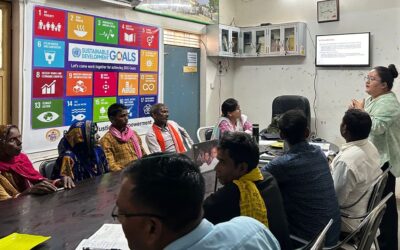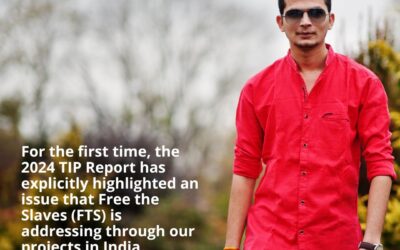For former slaves in India, the government’s provision of Rs.20,000 (approximately $333) makes a crucial difference for protecting themselves and their families from being re-enslaved. With these funds, they can buy some land, or livestock, or start up a small shop. It’s clear in the law that every individual officially released from bonded labor should get this help, but sometimes it takes dedicated long-term commitment and pressure to make it happen.
After a four-year struggle, 70 former child slaves rescued from embroidery factories in Delhi were finally able to hold their payment checks in their hands and truly believe that a different future could also be within their grasp.
When FTS partner, MSEMVS took responsibility for assisting the returned children, they formed community vigilance committees (CVC) in their villages to prevent traffickers from taking them off again, and to start changing the underlying reasons why they had been trafficked in the first place. Working with the CVCs, they got these children enrolled in school and made sure authorities provided school uniforms. Importantly, they ensured that these children (and others attending the schools) were receiving the required midday meals. MSEMVS arranged for the adults in their families to also get paid for work under the government’s Employment Guarantee program, and that the families registered for food rations and housing.
But still there was no sign of the essential Rs.20,000 payment. The CVC members and staff trekked time and time again to submit the applications and to try to get the central and local governments to work together to issue this support. Finally, tired of this negligence, many CVCs joined forces to hold a nonviolent one-day sit-down fast outside the district magistrate’s office. It caught the local media’s attention and the pressure began to build.
MSEMVS decided to bring in reinforcement. They filed a case against the local government with the National Commission for the Protection of Child Rights, the national body charged with ensuring that officials protect children at risk. Provided with all the evidence, the commission began to follow-up the case each month, with MSEMVS keeping them informed about whether they could see any progress.
Finally, the district magistrate ensured that the payments were made. The checks were handed over on October 2nd, the anniversary of the birthday of Mahatma Gandhi.
Learn more about FTS frontline work on our website’s India page.



